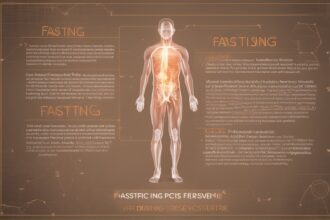Hey there, health enthusiasts! If you’ve ever wondered whether skipping a meal or two could actually be good for you, you’re in the right place. Fasting, a practice as old as time, has recently taken center stage in the wellness world, thanks to a growing body of fasting studies that highlight its potential benefits for weight loss, mental clarity, and even longevity. But what does the science really say? In this deep dive, we’ll unpack the latest research on fasting, explore how it works in the body, and share practical tips to help you decide if it’s right for you. Whether you’re curious about intermittent fasting or extended fasts, let’s break down the evidence and see what fasting can (and can’t) do for your health.
What Are Fasting Studies, and Why Do They Matter?
Let’s start with the basics. Fasting studies are scientific investigations into the effects of fasting—deliberately abstaining from food for a set period—on human health. These studies range from small clinical trials to large observational research projects, often focusing on intermittent fasting (IF), time-restricted eating, or prolonged fasting. Why do they matter? Well, fasting isn’t just a trend; it’s a practice rooted in cultural, religious, and now scientific contexts. Research helps us separate fact from hype, showing us how fasting impacts metabolism, brain function, and disease prevention. For instance, studies have shown that fasting can trigger autophagy, a cellular cleanup process linked to longevity (Mattson et al., 2017). With so much buzz around fasting, diving into credible research ensures we’re making informed choices rather than following fads.
The Science Behind Fasting: How It Affects Your Body
So, what happens when you fast? At its core, fasting shifts your body from using glucose (from food) to burning stored fat for energy, a state called ketosis. Fasting research reveals that this metabolic switch can lower insulin levels, improve blood sugar control, and reduce inflammation—key factors in preventing chronic diseases like diabetes and heart disease (de Cabo & Mattson, 2019). Beyond metabolism, fasting also impacts the brain. Studies suggest it boosts the production of brain-derived neurotrophic factor (BDNF), a protein tied to learning and memory, which could explain why many fasters report sharper focus (Mattson et al., 2018). While the mechanisms are complex, the takeaway is simple: fasting isn’t just about skipping meals; it’s a powerful tool to reset your body’s systems.
Key Findings from Recent Fasting Studies
Let’s get into some juicy details from recent fasting studies. The research landscape is exploding with insights, and here are some standout findings that might surprise you:
- Weight Loss and Metabolic Health: A 2020 review found that intermittent fasting can lead to 3-8% weight loss over 3-24 weeks, alongside improvements in insulin sensitivity (Welton et al., 2020). It’s not a magic bullet, but it’s promising for sustainable fat loss.
- Heart Health: Fasting may lower blood pressure, cholesterol, and triglycerides, reducing cardiovascular risk factors, according to a study on time-restricted eating (Wilkinson et al., 2020).
- Longevity and Aging: Animal studies suggest fasting mimics calorie restriction, extending lifespan by reducing oxidative stress, though human data is still emerging (de Cabo & Mattson, 2019).
- Gut Health: Early research indicates fasting can positively alter gut microbiota, potentially improving digestion and immunity, though more studies are needed (Cignarella et al., 2018).
These findings from fasting science paint an exciting picture, but they also come with caveats. Most studies are short-term, and long-term effects remain under investigation. Still, the evidence is stacking up in fasting’s favor for many health markers.
Different Types of Fasting Backed by Research
Not all fasting is created equal, and fasting studies often focus on specific protocols. If you’re new to this, understanding the types can help you pick one that fits your lifestyle. Here are a few research-backed methods:
- Intermittent Fasting (16/8 Method): You fast for 16 hours and eat during an 8-hour window. Studies show this improves metabolic health and aids weight loss (Welton et al., 2020).
- 5:2 Diet: Eat normally for 5 days, then restrict calories to 500-600 on 2 non-consecutive days. Research links it to fat loss and better blood sugar control.
- Time-Restricted Eating (TRE): Limit eating to a specific window (e.g., 12-6 PM). A 2020 trial found TRE reduces appetite and improves fat metabolism (Wilkinson et al., 2020).
- Prolonged Fasting: Fasting for 24-72 hours, often under medical supervision. While less studied, it’s tied to deeper autophagy and cellular repair (Mattson et al., 2017).
- Alternate-Day Fasting: Alternate between normal eating and severe calorie restriction. It’s effective for weight loss but harder to sustain long-term.
Each method has its pros and cons, and fasting research suggests starting small—maybe with a 12-hour overnight fast—before jumping into more intense protocols. Always listen to your body and consult a healthcare provider if you’re unsure.
Practical Tips for Starting Fasting Based on Science
Okay, so the science sounds great, but how do you actually start fasting without feeling like you’re starving? Drawing from fasting studies and real-world experience, I’ve got some actionable tips to ease you into it. Fasting doesn’t have to be torture—it’s about working with your body, not against it. First, pick a method that aligns with your schedule. If you’re a night owl, a later eating window might feel more natural. Second, stay hydrated; water, black coffee, and herbal tea can curb hunger pangs during fasting periods. Third, don’t overeat when breaking your fast—studies show that overcompensating can negate benefits (Welton et al., 2020). Start with nutrient-dense foods like veggies, lean protein, and healthy fats to refuel. Lastly, be patient. Your body needs time to adapt to this new rhythm, and hunger often fades after the first few days. Remember, fasting is a tool, not a punishment—ease into it and adjust as needed.
Potential Risks and What Fasting Studies Warn About
Before you dive headfirst into fasting, let’s talk about the flip side. While fasting science highlights plenty of benefits, it’s not for everyone, and research points to some risks. For starters, fasting can cause irritability, fatigue, or headaches in the early stages as your body adjusts. More seriously, it’s not recommended for pregnant women, children, or those with eating disorders, as it could exacerbate health issues (Mattson et al., 2018). Studies also warn that improper fasting—especially without adequate nutrition—might lead to muscle loss or nutrient deficiencies over time. If you have conditions like diabetes or low blood pressure, fasting could be risky without medical guidance. The key takeaway from fasting studies is clear: do your homework and prioritize safety. Chat with a doctor or dietitian before starting, especially if you’re on medications or have underlying health concerns.
At the end of the day, fasting studies offer a fascinating glimpse into how a simple act—skipping meals strategically—can profoundly impact our health. From boosting metabolism to potentially slowing aging, the science behind fasting is promising, even if it’s not fully settled. But here’s the thing: fasting isn’t a one-size-fits-all solution. It’s a personal journey, and what works for one person might not for another. Use the insights from fasting research as a guide, start slow, and pay attention to how your body responds. Whether you’re aiming for weight loss, mental clarity, or just curious about the hype, fasting could be worth a try—just do it mindfully. Got questions or experiences to share? Drop them in the comments; I’d love to hear how fasting has (or hasn’t) worked for you!
References
- Cignarella, F., Cantoni, C., Ghezzi, L., et al. (2018). Intermittent fasting confers protection in CNS autoimmunity by altering the gut microbiota. Cell Metabolism, 27(6), 1222-1235. https://doi.org/10.1016/j.cmet.2018.05.006
- de Cabo, R., & Mattson, M. P. (2019). Effects of intermittent fasting on health, aging, and disease. New England Journal of Medicine, 381(26), 2541-2551. https://doi.org/10.1056/NEJMra1905136
- Mattson, M. P., Longo, V. D., & Harvie, M. (2017). Impact of intermittent fasting on health and disease processes. Ageing Research Reviews, 39, 46-58. https://doi.org/10.1016/j.arr.2016.10.005
- Mattson, M. P., Moehl, K., Ghena, N., et al. (2018). Intermittent metabolic switching, neuroplasticity and brain health. Nature Reviews Neuroscience, 19(2), 63-80. https://doi.org/10.1038/nrn.2017.156
- Welton, S., Minty, R., O’Driscoll, T., et al. (2020). Intermittent fasting and weight loss: Systematic review. Canadian Family Physician, 66(2), 117-125. https://www.cfp.ca/content/66/2/117
- Wilkinson, M. J., Manoogian, E. N. C., Zadourian, A., et al. (2020). Ten-hour time-restricted eating reduces weight, blood pressure, and atherogenic lipids in patients with metabolic syndrome. Cell Metabolism, 31(1), 92-104. https://doi.org/10.1016/j.cmet.2019.11.004






